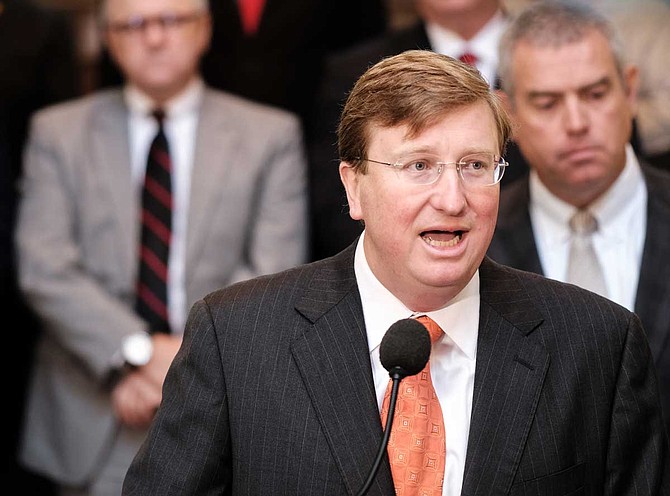With Mississippi Gov. Tate Reeves clearly stating that he opposed expanding early voting options in the state, any proposal to do so would need to win by a veto-proof margin, which would be more than two-thirds support in the state House and Senate. Photo by Ashton Pittman
JACKSON, Miss. (AP)—Mississippi Gov. Tate Reeves is making clear, even before the start of the 2021 legislative session, that he opposes any big changes in the way the state conducts elections.
About 1.3 million Mississippi residents voted in the 2020 presidential race, and the vast majority cast their ballots on Election Day. Republican Secretary of State Michael Watson said the state issued about 248,000 absentee ballots. Some people voted absentee by mail, and some cast absentee ballots in-person at circuit clerk's offices. Watson said absentee voting in 2020 was roughly double what it was during the 2016 presidential election.
In many places around Mississippi, people stood in long lines outside and inside precincts. The Republican governor said that he and his wife, Elee, stood in line more than an hour at a precinct near the Governor's Mansion in downtown Jackson—and he said he was OK with that.
“I believe in the institution of Election Day, and I have said that from the beginning," Reeves told reporters Dec. 14 at the Capitol, adding that he opposes expansion of mail-in voting.
Many states allow people to cast a ballot days or weeks in advance, at their convenience. That list includes Texas, Louisiana, Arkansas, Tennessee and Georgia. Efforts to enact early voting in Mississippi have hit a wall, so far.
With Reeves staking out his preference for the tradition of Election Day, singular, rather than Election Days, plural, any change would have to be made by a veto-proof margin with more than two-thirds support in the state House and Senate. Republicans control both chambers. For enough of them to go against the governor's wishes, they would need strong support from people back home. Republican lawmakers also would have to be convinced that early voting would help Republicans at least as much, if not more, than it would help Democrats.
According to the National Conference of State Legislatures, Mississippi is one of the 16 states that require people to have an excuse to cast an absentee ballot. In Mississippi, being out of town on Election Day because of work or school is an acceptable excuse. Wanting to avoid standing in line near other people during a pandemic is not.
Mississippi also allows absentee voting by anyone 65 or older or by anyone who has a permanent or temporary physical disability. Legislators made a temporary revision that expires at the end of 2020, allowing absentee voting by any person under a physician-imposed quarantine because of COVID-19 or by any person caring for a dependent who was under a such a quarantine.
Mississippi cities have elections for mayor and other officials in 2021, with party primaries in April and the general election in June. As the pandemic continues, it's unclear whether legislators will consider extending the absentee voting provisions tied to COVID-19 quarantine.
Democratic state Sen. David Blount of Jackson has filed bills for a number of years to create no-excuse early voting in Mississippi. He said he will do so again in 2021 because he believes legislators should do all they can to make it easier for people to vote in a secure manner.
“Most states already have it, most people want it and it's completely secure,” Blount told The Associated Press last week. “You have to walk in the courthouse past the sheriff's deputy, you work with a trained circuit clerk's staff person and you show your ID.”
Blount said such a system would have “zero potential for fraud.” As for needing a veto-proof margin, Blount said he hopes most legislators would see early voting is what their constituents want.
“Do we want more people to vote, or not? Do we want shorter lines on Election Day, or not?” Blount said. “Early voting helps with both of those questions.”
More like this story
- Gov. Tate Reeves Says He'd Veto Mail-in or Early Voting Expansion
- Advocates: Put Early Voting Proposal on Mississippi Ballot
- OPINION: What Will Election Day Look Like in Mississippi on Nov. 3? Prepare Now
- Expanded Voting Access Still Off Table For Mississippians
- Analysis: Mississippi Unlikely to Ease Its Election Laws



Comments
Use the comment form below to begin a discussion about this content.